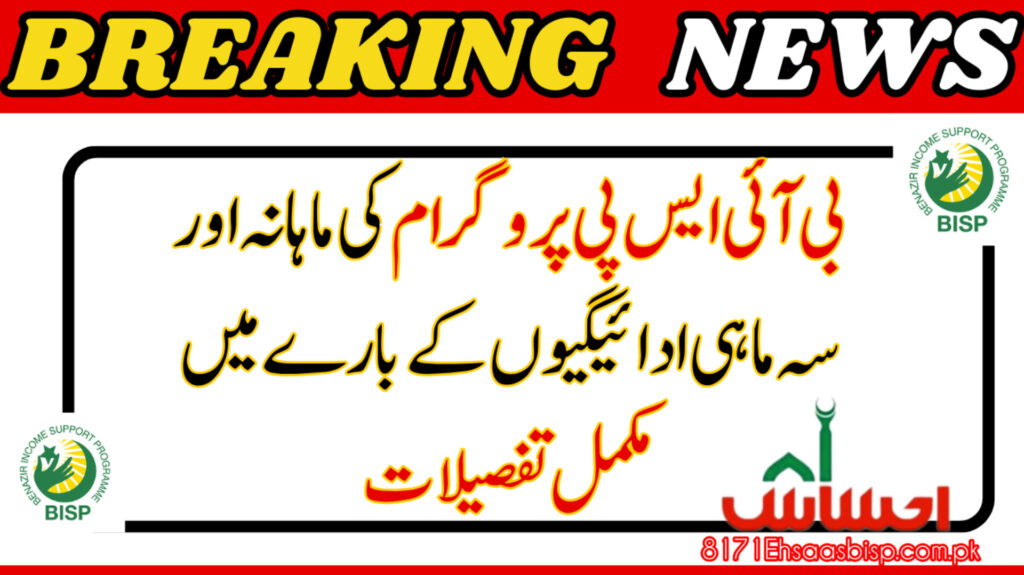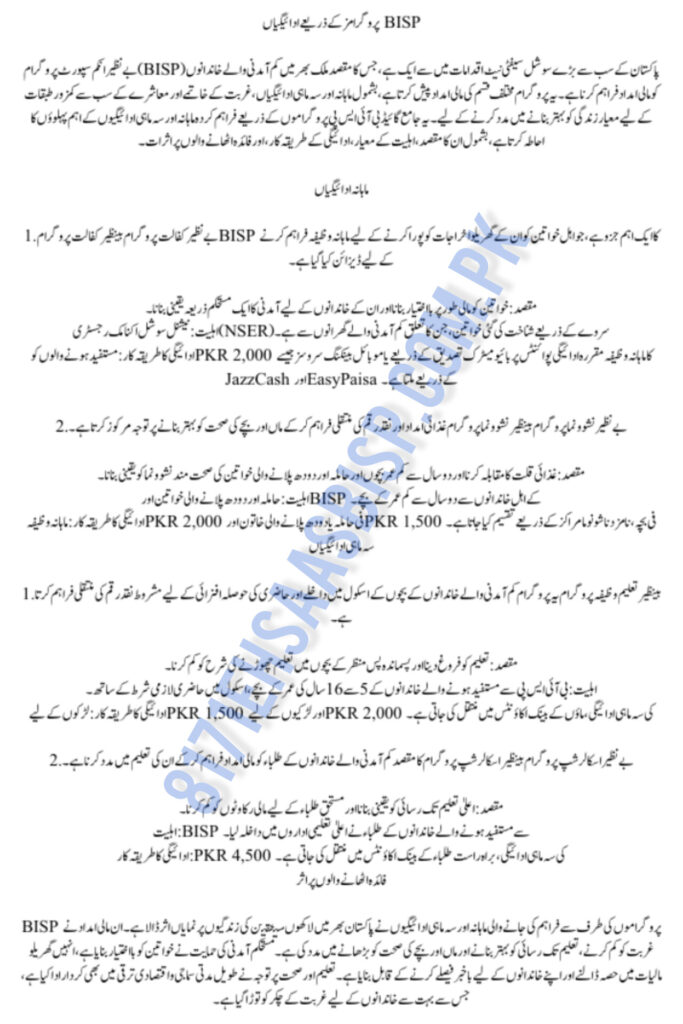
Introduction
The Benazir Income Support Program (BISP) is a major social safety net initiative in Pakistan, dedicated to providing financial aid to low-income families. BISP’s various financial assistance programs, including monthly and quarterly payments, are designed to reduce poverty and improve living standards for the country’s most vulnerable populations. This comprehensive overview delves into the details of BISP’s monthly and quarterly payments, highlighting their objectives, eligibility criteria, disbursement methods, and their impact on beneficiaries.
Monthly Payments
Benazir Kafalat Program
The Benazir Kafalat Program is a pivotal part of BISP, aiming to provide a regular stipend to eligible women to help manage household expenses.
- Objective: To empower women financially and ensure a consistent income stream for their families.
- Eligibility: Women identified through the National Socio-Economic Registry (NSER) survey who belong to low-income households.
- Disbursement: Beneficiaries receive a monthly stipend of PKR 2,000 via biometric verification at specified payment points or through mobile banking services like JazzCash and EasyPaisa.
Benazir Nashonuma Program
The Benazir Nashonuma Program focuses on enhancing maternal and child health through nutritional support and cash transfers.
- Objective: To combat malnutrition and ensure healthy growth for children under two years and pregnant and lactating women.
- Eligibility: Pregnant and lactating women and children under two years from BISP-eligible families.
- Disbursement: A monthly stipend of PKR 2,000 per pregnant or lactating woman and PKR 1,500 per child, distributed through designated Nashonuma Centers.

Quarterly Payments
Benazir Taleemi Wazifa Program
This program provides conditional cash transfers to encourage school enrollment and attendance among children from low-income families.
- Objective: To promote education and reduce dropout rates among children from disadvantaged backgrounds.
- Eligibility: Children aged 5 to 16 years from BISP beneficiary families, with mandatory school attendance.
- Disbursement: Quarterly payments of PKR 1,500 for boys and PKR 2,000 for girls, credited to the mothers’ bank accounts.
- See Also:-}
- Breaking News: How to Apply for the Agriculture Internship Program: A Detailed Guide 2024
- Exclusive Updates: Punjab Government Announces Major Recruitment Drive for 30,000 Teachers 2024
- Breaking News: Sindh Textbook Board Launches Ambitious Tablet Distribution Initiative for Students 2024
- ASF Jobs Apply Before August 25, 2024 – Complete Guide
- Exclusive News: Huawei Train the Trainer Program: A Groundbreaking Initiative for Pakistani Students in 2024
Benazir Scholarship Program
The Benazir Scholarship Program aims to support the education of students from low-income families by providing financial assistance.
- Objective: To ensure access to higher education and minimize financial obstacles for deserving students.
- Eligibility: Students from BISP beneficiary families enrolled in higher education institutions.
- Disbursement: Quarterly payments of PKR 4,500, directly transferred to the students’ bank accounts.
Impact on Beneficiaries
The monthly and quarterly payments provided by BISP programs have significantly impacted the lives of millions of beneficiaries across Pakistan. These financial aids have played a crucial role in reducing poverty, improving access to education, and enhancing maternal and child health. The consistent income support has empowered women, enabling them to contribute to household finances and make informed decisions for their families. Additionally, the focus on education and health has fostered long-term socio-economic development, breaking the cycle of poverty for many families.
Frequently Asked Questions (FAQs)
- How can I check my eligibility for BISP programs?
- You can verify your eligibility by visiting the official BISP website or sending your CNIC number to the designated SMS code provided by BISP. Alternatively, you can visit the nearest BISP office or contact the BISP helpline for assistance.
- What documents are required to register for BISP programs?
- The primary document required is a valid Computerized National Identity Card (CNIC). Additional documents may include proof of income, household information, and school enrollment certificates for education-related programs.
- How are BISP payments disbursed?
- BISP payments are disbursed through multiple channels, including biometric verification at designated payment points, mobile banking services (JazzCash, EasyPaisa), and direct bank transfers.
- What should I do if I do not receive my BISP payment on time?
- If you do not receive your payment on time, contact the BISP helpline or visit the nearest BISP office for assistance. Ensure that your contact and bank details are up-to-date to avoid any delays.
- Can I appeal if my BISP application is rejected?
- Yes, you can appeal if your application is rejected. Visit the nearest BISP office and submit an appeal form, providing additional information or documents to support your case.
- Are BISP payments subject to any conditions?
- Some BISP payments, such as those under the Benazir Taleemi Wazifa Program, are conditional. Beneficiaries must meet specific criteria, such as regular school attendance, to receive the payments.
- Can BISP beneficiaries receive payments through more than one program?
- Yes, beneficiaries can receive payments through multiple BISP programs if they meet the eligibility criteria for each program.
- How does BISP ensure transparency and prevent fraud in payment disbursements?
- BISP employs biometric verification, digital payment systems, and regular audits to ensure transparency and prevent fraud in payment disbursements. Beneficiaries’ details are periodically verified to maintain accuracy.
- Are there any special initiatives for remote or underserved areas under BISP?
- Yes, BISP has special initiatives and outreach programs to ensure that beneficiaries in remote or underserved areas receive timely assistance and support.
- How can I update my contact or bank details for BISP payments?
- You can update your contact or bank details by visiting the nearest BISP office or through the BISP helpline. Ensure you provide accurate information to avoid any disruptions in payment.
Conclusion
The monthly and quarterly payments provided by BISP programs are instrumental in alleviating poverty and fostering socio-economic development in Pakistan. These financial aids not only offer immediate relief to low-income families but also contribute to long-term improvements in education, health, and women’s empowerment. By ensuring transparency and efficient disbursement mechanisms, BISP continues to support millions of beneficiaries, helping them build a better future for themselves and their communities.
